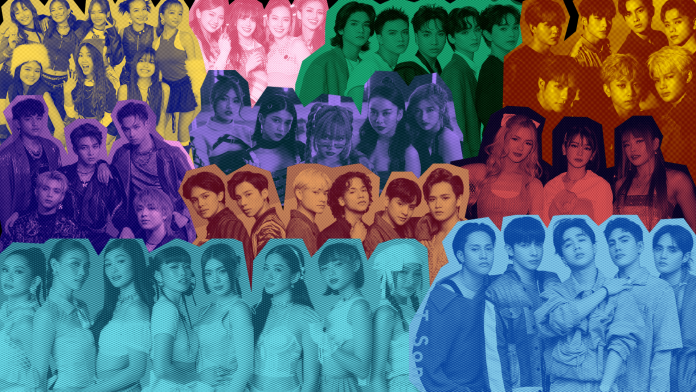As K-pop continues to expand its global influence, the question arises: will P-pop follow suit?
Can P-pop — a genre that has only recently begun to receiving the attention it deserves —reach similar heights? While some dismiss P-pop as merely a copy of K-pop, it’s important to understand the unique roots and potential of Filipino pop.
What makes P-pop especially notable is its ability to maintain Filipino cultural authenticity while embracing global shifts. The truth is, Pinoy pop is a genre with its own identity—rooted in Filipino culture and enriched by modern music trends.
I remember when people used to criticize P-pop groups for “copying” K-pop. There were countless debates online—like one I stumbled upon where a user on X (formerly Twitter) said, “That’s why I don’t stan P-pop, because of their toxic fandom,” while another boldly claimed, “P-pop is here to bankrupt K-pop and the lipsync community.” Both statements illustrate how misunderstood P-pop is—from its musical style to its fanbases.
For me, it became clear that the feud wasn’t really about music—it was more about territorial pride and a refusal to see the genre’s potential. K-pop may have been an influence, but P-pop has always been more than just a replica. For a long time, Filipino pop acts didn’t receive widespread praise. P-pop was often seen as an imitation—but this perspective couldn’t be further from reality.
Filipino talent has always been celebrated, whether through singing, dancing, or acting. “Are you even Filipino if you can’t dance, sing, or act?” was a question I often heard growing up, reinforcing how deeply talent is valued in our culture.
It wasn’t until the rise of digital platforms like YouTube, TikTok, and Spotify that P-pop began reaching global audiences. These platforms gave artists the exposure they long deserved, allowing their music to be shared, appreciated, and celebrated around the world. The impact of P-pop goes beyond entertainment—it carries cultural significance and has the potential to shape the future of the global music industry.
P-pop has finally gained momentum. Filipino artists are showcasing a unique blend of Western influences and Filipino culture. Groups like SB19, BINI, and others have elevated the genre with catchy melodies, high-quality production, and performances that rival global pop stars. Their success is a testament to the talent and dedication of Filipino artists who are unafraid to push boundaries.
One key factor behind P-pop’s rise is the diversity of talent within its groups. Many artists excel not only in singing but also in dancing, songwriting, and producing. P-pop music is deeply rooted in Filipino culture, often focusing on storytelling, personal experiences, and community values—giving it an emotional depth that resonates with listeners.
P-pop fans, or “P-pop stans,” have also played a crucial role in spreading the music, building online communities, and sharing content that helps artists gain international recognition.
Platforms like JuanCast are instrumental in supporting these artists and ensuring they get the appreciation and exposure they deserve. Platforms that allow fans to vote and support their favorite acts foster visibility and recognition for P-pop artists. By giving Filipino talent a stage, these platforms help expand P-pop’s reach to global audiences.
While K-pop has leaned heavily into Western influences in recent years, P-pop blends modern styles with uniquely Filipino references that resonate with both local and international fans. Through songs in Tagalog, Cebuano, and even Indigenous languages, P-pop artists preserve the Philippines’ rich cultural heritage while embracing global trends. This fusion of tradition and innovation makes P-pop both refreshing and relatable.
P-pop also boosts national pride. As Filipinos, even the simplest representation of our culture can fill us with pride. Watching our artists represent the country internationally is empowering. They’re not just performers—they embody the Filipino spirit and the value of Bayanihan. They show the world that the Philippines has more to offer than beautiful beaches and amazing food.
This genre also inspires young Filipino artists to dream big and claim their space on the global stage. As more groups form and more talents get signed, the future looks bright. P-pop’s influence is spreading far beyond our shores, and with continued digital support, it’s only going to grow.
And this movement isn’t just about P-pop—it’s part of a broader wave of Asian music taking over the world. P-pop is stepping into the spotlight, changing the game, and contributing to the evolution of global music tastes. As the world embraces more sounds from Asia, we’re witnessing a cultural shift that will shape the music industry for years to come.
The rise of P-pop isn’t just a trend—it’s a cultural movement. Its ability to influence global music, foster artist collaborations, and redefine the industry is already becoming clear. For Filipinos, P-pop is more than entertainment—it’s a reflection of who we are. Supporting P-pop and platforms like JuanCast means building a more inclusive music industry that celebrates diversity.
In the end, P-pop’s rise is proof that music transcends borders. It unites us, reflects a globalized world, and deserves our support, appreciation, and respect.
